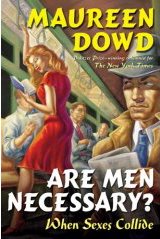
Maureen Dowd's suddenly infamous "What's A Modern Girl To Do?" has sparked quite a bit of debate from on-line women and feminists. The piece, which ran in the New York Times Magazine, is an excerpt from Dowd's forthcoming book Are Men Necessary? (I have to say that I really like this title -- much better than the stupid Doris Day-type title used for the excerpt). Anyway, the responses range from reluctant agreement to straight up vitriolic, with almost everyone weighing in noting that Dowd's, er, research methods seem limited and questionable.
Now, I have to admit that it took me awhile to read the article -- I found it sort of boring and tedious. I was never a fan of Sex and the City. I will never have enough money to buy a pair of Jimmy Choos (and even if I did I don't think I'd spend it on something like a pair of heels that were probably made in a sweat shop). And I've never ever for one second wondered if being smart made me less attractive (if anything, I've wasted time worrying that I am not smart enough). In short, I don't really identify with the women depicted in Dowd's article even though I recognize them from TV shows and magazine articles and so-called "chick-lit" novels. Now don't get me wrong, it's not that I don't care about these women -- when I say I'm a feminist I mean that I care about everybody -- but rather that I feel their trials and tribulations are very visible. Nothing in Dowd's article was "news" to me, even though it was annoyingly presented as such.
Dowd's article focused on the issues that affect upper-class, educated women, and this (to me) made it less interesting -- not only because it covered familiar territory, but also because Dowd's questions and concerns can seem trivial and silly when compared to the feminist issues she ignores -- namely those issues that affect poor and working class women. For example, why not discuss the ways in which a feminist agenda could help single mothers who have been displaced by hurricane Katrina, or the poor, working women who clock in at more than one forty-hour-a-week job? These are the women who need to be written about. These are the women whose lives are virtually invisible in the MSM.
The fact that Dowd's excerpt doesn't address issues that affect women outside her own demographic seems more than an oversight; rather, it seems as though she purposely avoids dealing with any details that might complicate her thesis -- that life as a woman when you're educated, economically secure, and heterosexual is still hard, even with feminism. Certainly any difficulties women who fit this profile face certainly must affect those women who live outside metropolitan areas, those without an education, and those without a white-collar job. Feminism's efficacy and influence can't be assessed without considering the lives of all women (including girls) -- not just those who google and do yoga.
That said, Dowd's piece highlights (in its omissions) those areas where feminism could and should be doing more. This can seem difficult, especially when anxiety about the meaning of "the f word" is complicated (and likely to arouse suspicion) outside the hallowed realms of academia , the DIY world of riot grrrls, and organizations like NOW and Planned Parenthood. Certainly much important work happens and continues to happen in these places. But still more needs to happen.
Dowd's article suggests that feminism has failed -- as if feminism is something that is over. Rather than a movement that is linear and terminal, feminism might be better described as rhizomatic and ongoing. In this sense, we can ask what feminism needs to do next -- not how feminism has "failed."
Just because Dowd doesn't discuss the needs of poor and working class women doesn't mean that nobody does. Here are some links to people who are asking good questions.
Jennifer Gordon
Naila Kabeer
Bertha Lewis
Cynthia Enloe
Hilary Wainwright
Barbara Ehrenreich
2 comments:
Dowd? Research? But why? When she's such a *snappy* writer! She is the Harriet Miers of the NYT . . . unqualified, misguided, token-darling and she satisfies no one. Perhaps a group of concerned citizens who'd like to see real research on the serious issues you've raised, from a feminist perspective, on the editorial pages of the NYT, ought to create an open letter or something . . . I've heard similar complaints to yours from many, many people I respect. I'd add that an "international" feminist perspective (someone on foreign relations, US perception abroad, international poverty and economic issues) would be a strong addition.
I always appreciate commentary from Maureen Dowd, she is very sharp on her toes. I just read the NYT article and enjoyed it very much, but you are absolutely right that most ivory-tower feminists are only concerned with the issues that affect their own demographic, namely upper class ivy-league educated white city/suburban women. I know we all think of the South as being more traditional and "backwards", but actually I find the woman down there more "equal" to men because they work and support their families and don't expect the whole "princess treatment" or act all fragile the way Manhattan women do. It's common knowledge that modern young women have rejected old-school feminism, there's nothing new there and Dowd's article is just re-hashing a tired topic, but I liked how she wrapped it up by stating that in 2030 many of those same women will find themselves middle-aged and powerless, trapped in Suburbia.
Post a Comment